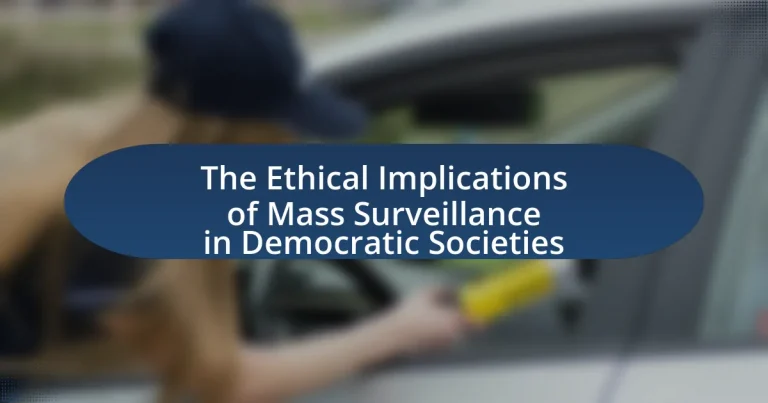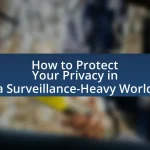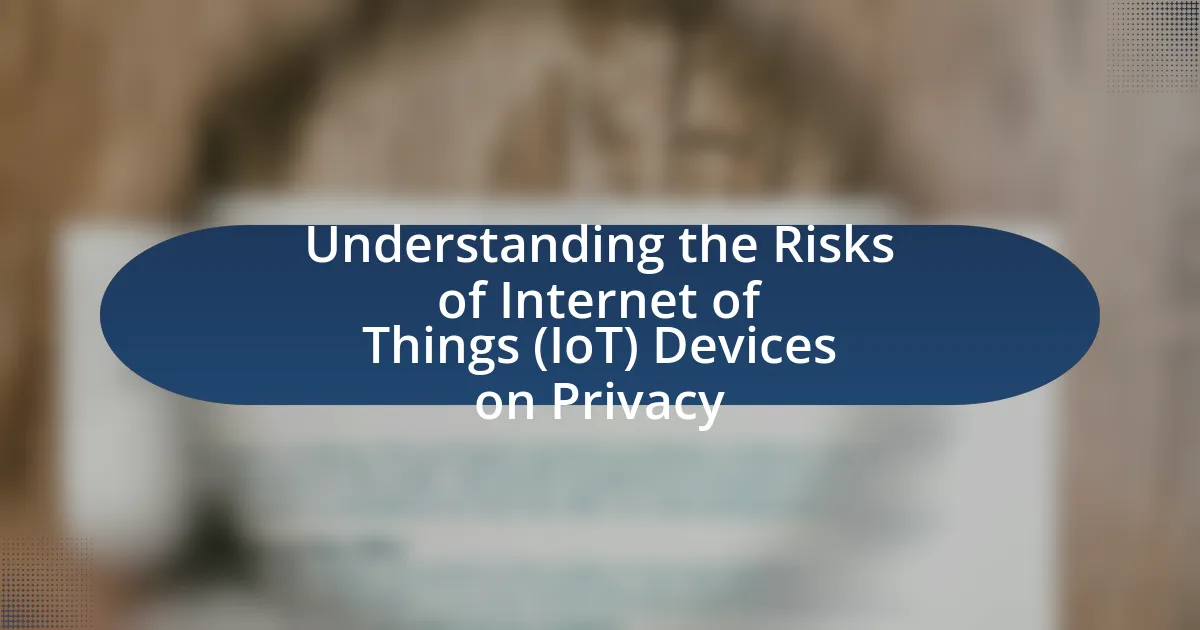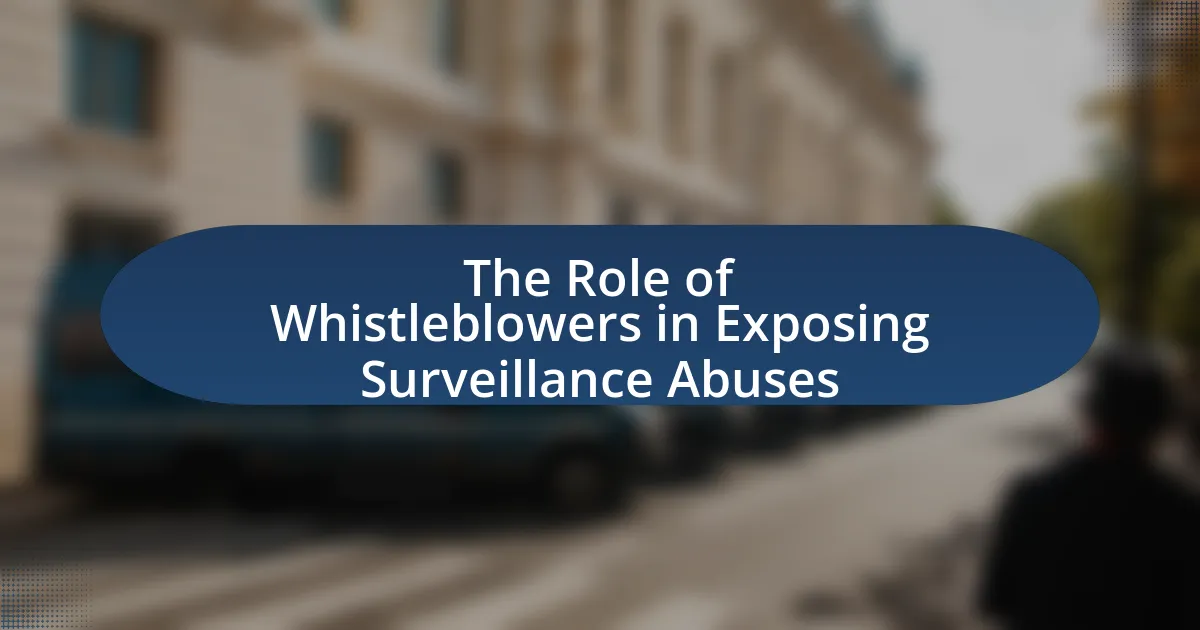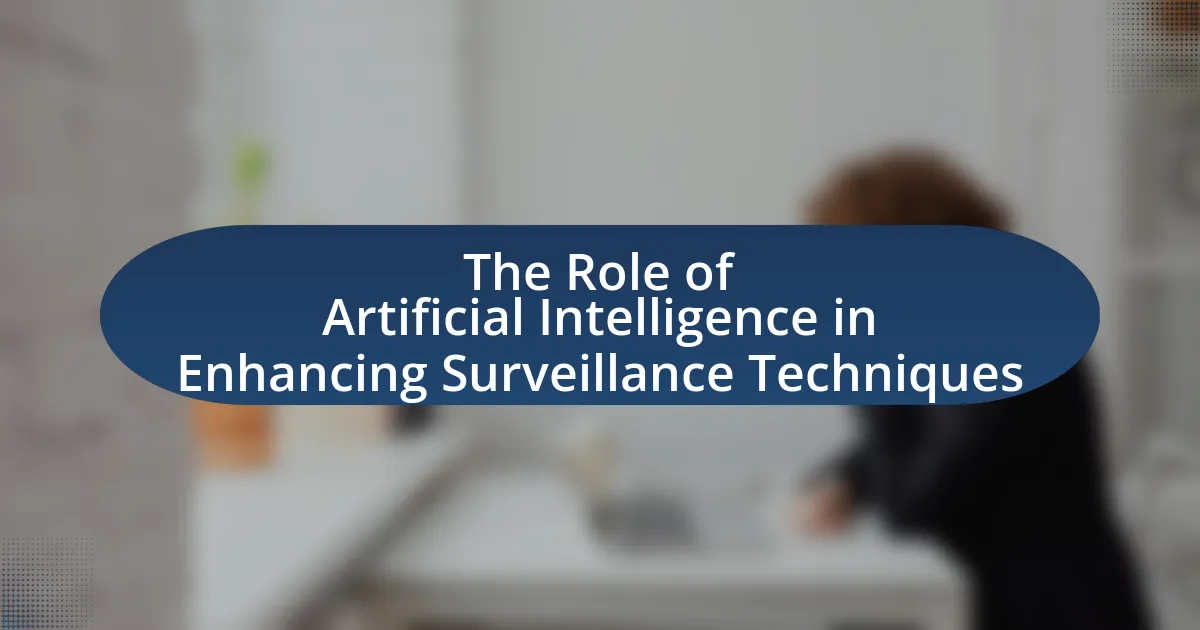The article examines the ethical implications of mass surveillance in democratic societies, focusing on privacy rights, civil liberties, and the impact on public trust in government institutions. It highlights how extensive monitoring can lead to self-censorship, particularly among marginalized communities, and discusses the challenges mass surveillance poses to democratic values such as accountability and freedom of expression. The article also explores various ethical frameworks, including utilitarianism and deontological ethics, and suggests potential solutions to address the ethical dilemmas associated with surveillance practices, emphasizing the need for transparency, legal protections, and active citizen engagement in shaping surveillance policies.
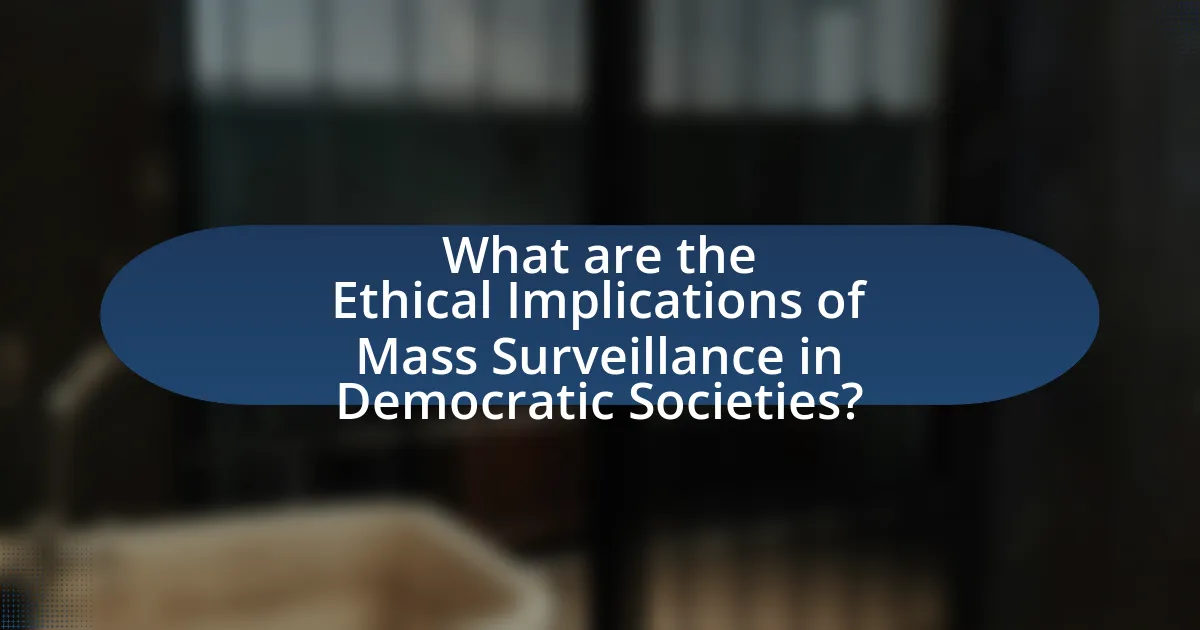
What are the Ethical Implications of Mass Surveillance in Democratic Societies?
Mass surveillance in democratic societies raises significant ethical implications, primarily concerning privacy rights and civil liberties. The extensive monitoring of citizens can lead to a chilling effect on free speech and dissent, as individuals may self-censor due to fear of being watched. Research by the Electronic Frontier Foundation highlights that mass surveillance disproportionately affects marginalized communities, exacerbating existing inequalities. Furthermore, the lack of transparency and accountability in surveillance practices can undermine public trust in government institutions, as seen in the backlash against the NSA’s surveillance programs revealed by Edward Snowden in 2013. These ethical concerns necessitate a careful balance between national security interests and the protection of individual rights in democratic frameworks.
How does mass surveillance challenge democratic values?
Mass surveillance challenges democratic values by undermining individual privacy rights and eroding public trust in government institutions. In democratic societies, the protection of personal privacy is fundamental, as it allows citizens to express dissent and engage in free speech without fear of retribution. Studies, such as those conducted by the Electronic Frontier Foundation, indicate that pervasive monitoring can lead to self-censorship among individuals who feel their actions are being watched. Furthermore, mass surveillance can create a power imbalance, where the state possesses extensive information about citizens, potentially leading to abuses of power and discrimination. This dynamic contradicts the democratic principle of accountability, as citizens may feel less empowered to hold their government accountable when they are aware of being constantly surveilled.
What specific democratic principles are at risk due to mass surveillance?
Mass surveillance poses a significant risk to the democratic principles of privacy, freedom of expression, and accountability. Privacy is compromised as individuals are monitored without consent, undermining the right to personal autonomy and confidentiality. Freedom of expression is threatened because individuals may self-censor their speech and actions, fearing repercussions from surveillance. Accountability is diminished when government actions are obscured by surveillance practices, leading to a lack of transparency and potential abuse of power. These risks are supported by studies indicating that pervasive surveillance can create a chilling effect on civil liberties, as evidenced by the findings of the 2018 report by the Electronic Frontier Foundation, which highlights the detrimental impact of surveillance on democratic engagement and public discourse.
How does mass surveillance affect public trust in government?
Mass surveillance significantly erodes public trust in government. When citizens perceive that their privacy is being invaded through extensive monitoring, they often feel a sense of betrayal and fear, leading to skepticism about the government’s intentions. Research conducted by the Pew Research Center in 2017 indicated that 62% of Americans believed that government surveillance programs were not effective in preventing terrorism, which further diminishes trust. Additionally, studies show that transparency in government operations is crucial for maintaining public confidence; mass surveillance typically operates in secrecy, undermining accountability and fostering a culture of distrust.
What ethical frameworks can be applied to mass surveillance?
Utilitarianism, deontological ethics, and virtue ethics are the primary ethical frameworks that can be applied to mass surveillance. Utilitarianism evaluates actions based on their consequences, suggesting that mass surveillance may be justified if it leads to greater overall security and safety for the majority. Deontological ethics focuses on the morality of actions themselves, arguing that mass surveillance may violate individual rights and privacy regardless of potential benefits. Virtue ethics emphasizes the character and intentions behind actions, questioning whether mass surveillance aligns with virtues such as respect and trust. Each framework provides a distinct lens through which to assess the ethical implications of mass surveillance in democratic societies.
How do utilitarian perspectives view mass surveillance?
Utilitarian perspectives generally view mass surveillance as justifiable if it leads to a greater overall good, such as enhanced public safety and crime prevention. This ethical framework evaluates actions based on their consequences, suggesting that if mass surveillance can significantly reduce crime rates or prevent terrorist attacks, the benefits may outweigh the potential harms, such as privacy violations. For instance, a study by the University of California, Berkeley, found that cities with extensive surveillance systems experienced a notable decrease in crime, supporting the utilitarian argument that the collective safety gained can justify the intrusion into individual privacy.
What are the deontological arguments against mass surveillance?
Deontological arguments against mass surveillance assert that it violates fundamental moral principles, particularly the right to privacy and individual autonomy. These arguments emphasize that individuals possess inherent rights that should not be infringed upon, regardless of the potential benefits of surveillance. For instance, Immanuel Kant’s ethical framework posits that individuals should be treated as ends in themselves, not merely as means to an end; mass surveillance treats individuals as mere data points for security purposes, undermining their dignity. Additionally, the principle of informed consent is often violated in mass surveillance practices, as individuals are typically unaware of the extent of surveillance or have not explicitly agreed to it. This lack of consent further reinforces the deontological stance that such practices are morally impermissible.
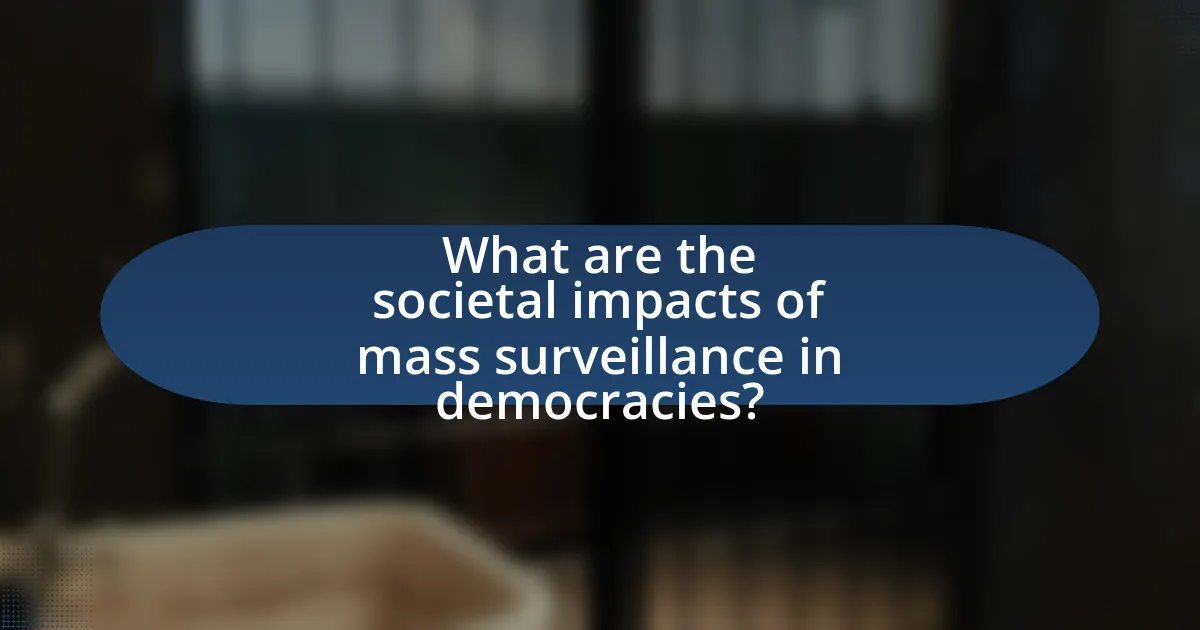
What are the societal impacts of mass surveillance in democracies?
Mass surveillance in democracies significantly impacts societal trust and individual freedoms. It often leads to a chilling effect on free speech, as citizens may self-censor due to the fear of being monitored. Research by the Pew Research Center indicates that 54% of Americans feel that government surveillance is a major threat to their personal privacy, which can deter public participation in democratic processes. Furthermore, mass surveillance can exacerbate social inequalities, as marginalized communities may be disproportionately targeted, leading to increased stigmatization and discrimination. A study published in the journal “Surveillance & Society” highlights that surveillance practices can create an environment of suspicion and fear, undermining social cohesion and trust in institutions.
How does mass surveillance influence individual privacy rights?
Mass surveillance significantly undermines individual privacy rights by enabling the continuous monitoring and collection of personal data without consent. This pervasive oversight creates a chilling effect, where individuals may alter their behavior due to the awareness of being watched, thus infringing on their freedom of expression and association. Research by the Electronic Frontier Foundation indicates that mass surveillance can lead to self-censorship, as individuals may avoid discussing sensitive topics or engaging in political dissent for fear of repercussions. Furthermore, legal frameworks in democratic societies, such as the Fourth Amendment in the United States, are challenged by mass surveillance practices, which often blur the lines of lawful search and seizure, leading to potential violations of constitutional rights.
What are the legal protections for privacy in democratic societies?
Legal protections for privacy in democratic societies include constitutional rights, statutory laws, and regulatory frameworks that safeguard individual privacy against government and private sector intrusions. For instance, many democracies enshrine the right to privacy in their constitutions, such as the Fourth Amendment in the United States, which protects against unreasonable searches and seizures. Additionally, laws like the General Data Protection Regulation (GDPR) in the European Union establish strict guidelines for data protection and privacy, requiring consent for data processing and granting individuals rights over their personal information. These legal frameworks are designed to balance the need for security with the protection of individual freedoms, ensuring that surveillance practices do not infringe upon citizens’ rights.
How do citizens perceive their privacy in the context of surveillance?
Citizens generally perceive their privacy as being significantly compromised in the context of surveillance. A 2021 survey by the Pew Research Center found that 81% of Americans feel that the potential risks of companies collecting their personal data outweigh the benefits. This perception is influenced by concerns over government surveillance, data breaches, and the misuse of personal information. Furthermore, studies indicate that individuals often feel a loss of control over their personal information, leading to anxiety and distrust towards institutions that engage in surveillance practices.
What are the implications for marginalized communities?
Mass surveillance has significant implications for marginalized communities, primarily exacerbating existing inequalities and fostering discrimination. Research indicates that these communities often face heightened scrutiny and surveillance, leading to a loss of privacy and increased vulnerability to state actions. For instance, studies show that racial and ethnic minorities are disproportionately targeted by surveillance technologies, such as facial recognition systems, which have higher error rates for these groups. This can result in wrongful accusations and a chilling effect on free expression and activism. Furthermore, the pervasive nature of surveillance can undermine trust in public institutions, as marginalized individuals may feel that they are constantly monitored and judged, which can deter them from seeking help or participating in civic activities.
How does mass surveillance disproportionately affect certain groups?
Mass surveillance disproportionately affects marginalized groups, including racial minorities, low-income individuals, and activists. These groups often face heightened scrutiny and surveillance due to systemic biases and societal prejudices, leading to increased risks of discrimination and civil rights violations. For instance, studies have shown that Black and Hispanic communities are more frequently monitored by law enforcement agencies, as evidenced by the disproportionate use of surveillance technologies in their neighborhoods compared to predominantly white areas. Additionally, activists and dissenters are often targeted under the guise of national security, which can stifle free expression and assembly. This pattern of surveillance not only reinforces existing inequalities but also perpetuates a cycle of mistrust between these communities and governmental institutions.
What are the long-term societal consequences of surveillance on these communities?
The long-term societal consequences of surveillance on communities include erosion of trust, increased social division, and potential normalization of invasive monitoring practices. Surveillance creates a climate of fear and suspicion, leading individuals to self-censor and alter their behavior, which can stifle free expression and civic engagement. Studies, such as those conducted by the American Civil Liberties Union, indicate that communities under constant surveillance often experience heightened anxiety and a sense of alienation, particularly among marginalized groups. Furthermore, the normalization of surveillance can lead to the acceptance of privacy violations as a standard practice, undermining democratic values and civil liberties over time.
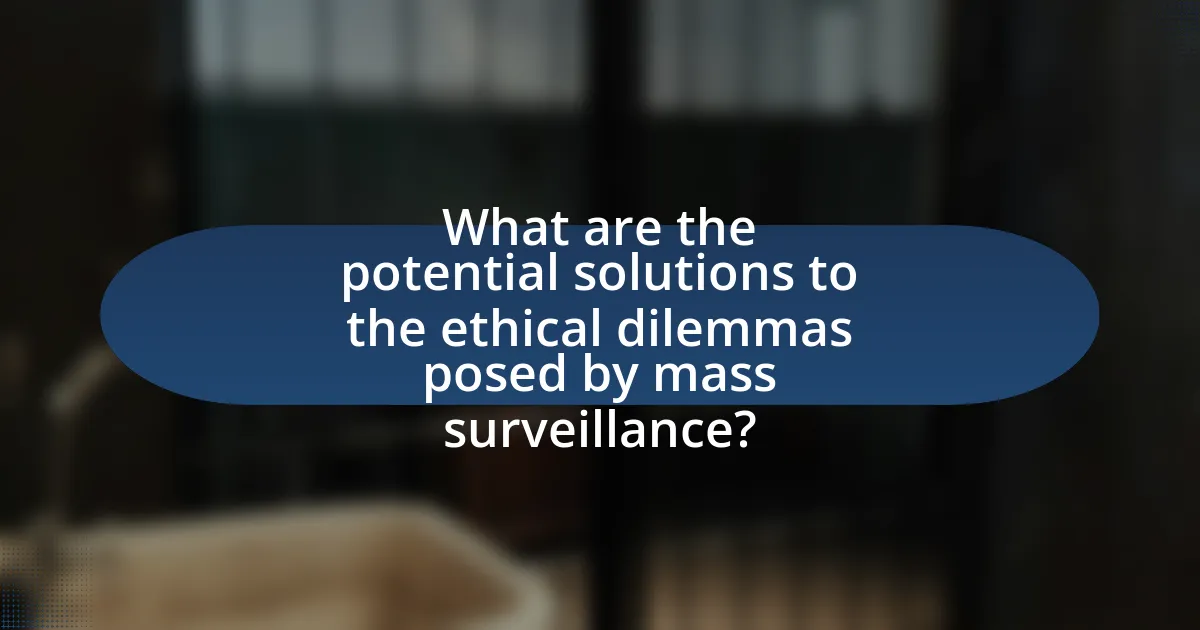
What are the potential solutions to the ethical dilemmas posed by mass surveillance?
Potential solutions to the ethical dilemmas posed by mass surveillance include implementing strict legal frameworks that govern surveillance practices, ensuring transparency and accountability in data collection, and promoting public discourse on privacy rights. Legal frameworks, such as the General Data Protection Regulation (GDPR) in the European Union, establish clear guidelines for data handling and individual rights, thereby protecting citizens from potential abuses. Transparency measures, such as requiring government agencies to disclose surveillance activities and their purposes, can help build public trust and allow for informed debate. Additionally, fostering public discourse encourages citizens to engage with privacy issues, leading to more democratic oversight and potential reforms in surveillance policies.
How can democratic societies balance security and privacy?
Democratic societies can balance security and privacy by implementing transparent legal frameworks that govern surveillance practices while ensuring robust oversight mechanisms. For instance, laws such as the USA PATRIOT Act and the General Data Protection Regulation (GDPR) in Europe establish guidelines that protect individual privacy rights while allowing for necessary security measures. Additionally, independent oversight bodies, such as privacy commissions, can monitor surveillance activities to prevent abuse and ensure compliance with privacy standards. This dual approach of legal regulation and oversight helps maintain public trust while addressing security concerns effectively.
What policies can be implemented to protect citizens’ rights?
To protect citizens’ rights in the context of mass surveillance, policies such as robust data protection laws, transparency requirements for surveillance practices, and independent oversight bodies can be implemented. Data protection laws, like the General Data Protection Regulation (GDPR) in the European Union, establish strict guidelines on how personal data is collected, processed, and stored, ensuring individuals have control over their information. Transparency requirements mandate that government agencies disclose their surveillance activities and the legal frameworks governing them, fostering public trust and accountability. Independent oversight bodies, such as privacy commissions, can monitor surveillance practices, investigate complaints, and ensure compliance with legal standards, thereby safeguarding citizens’ rights against potential abuses.
How can technology be used to enhance privacy in surveillance systems?
Technology can enhance privacy in surveillance systems through the implementation of encryption, anonymization techniques, and advanced data management protocols. Encryption secures video feeds and data storage, ensuring that only authorized personnel can access sensitive information, thereby reducing the risk of unauthorized surveillance. Anonymization techniques, such as blurring faces or using pixelation, protect individual identities in recorded footage, which is crucial for maintaining personal privacy. Additionally, advanced data management protocols, including strict access controls and audit trails, ensure that data is only used for its intended purpose and is not misused, aligning with ethical standards in democratic societies. These technological measures collectively contribute to a more privacy-conscious approach in surveillance practices.
What role do citizens play in shaping surveillance policies?
Citizens play a crucial role in shaping surveillance policies by actively participating in public discourse, advocating for privacy rights, and influencing legislative processes. Through civic engagement, such as voting, attending town hall meetings, and joining advocacy groups, citizens can express their concerns about surveillance practices and demand accountability from government entities. For instance, the widespread public outcry following the Edward Snowden revelations in 2013 led to significant discussions around the reform of surveillance laws in the United States, highlighting how citizen activism can directly impact policy changes. Additionally, surveys indicate that a majority of citizens prioritize privacy protections, which can compel lawmakers to consider public sentiment when drafting or amending surveillance legislation.
How can public awareness and activism influence surveillance practices?
Public awareness and activism can significantly influence surveillance practices by promoting transparency and accountability in government actions. When citizens are informed about surveillance methods and their implications, they are more likely to advocate for policies that protect privacy rights. For instance, the 2013 revelations by Edward Snowden regarding the NSA’s mass surveillance programs sparked widespread public outcry and led to legislative changes, such as the USA Freedom Act, which aimed to limit government surveillance capabilities. This demonstrates that organized activism can effectively challenge and reshape surveillance policies in democratic societies.
What are effective strategies for advocating for privacy rights?
Effective strategies for advocating for privacy rights include raising public awareness, engaging in policy advocacy, and building coalitions with like-minded organizations. Raising public awareness involves educating individuals about their privacy rights and the implications of surveillance through campaigns, workshops, and social media outreach. Engaging in policy advocacy requires lobbying lawmakers to enact stronger privacy protections and participating in public consultations to influence legislation. Building coalitions with organizations that share similar goals enhances the impact of advocacy efforts, as seen in successful campaigns like the Electronic Frontier Foundation’s initiatives, which have led to significant legal reforms in privacy rights.
What best practices can be adopted to mitigate the ethical concerns of mass surveillance?
To mitigate the ethical concerns of mass surveillance, implementing strict data protection regulations is essential. These regulations should include transparency requirements, ensuring that individuals are informed about data collection practices and the purposes behind them. For instance, the General Data Protection Regulation (GDPR) in the European Union mandates that organizations must obtain explicit consent from individuals before processing their personal data, thereby enhancing accountability and trust. Additionally, employing data minimization principles, where only necessary data is collected and retained for the shortest time possible, can significantly reduce privacy risks. Research indicates that organizations adhering to these practices experience fewer breaches and greater public confidence, as seen in studies conducted by the International Association of Privacy Professionals. Furthermore, establishing independent oversight bodies to monitor surveillance activities can help ensure compliance with ethical standards and protect citizens’ rights.
